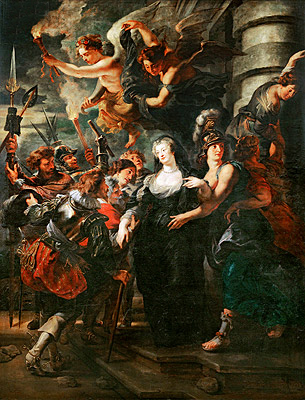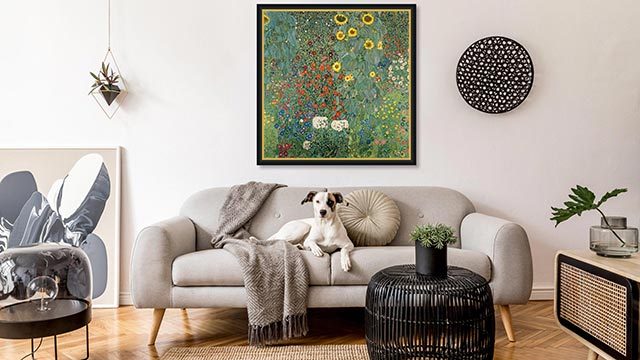Marie de Medici Escaping from Blois, 21st-22nd February 1619 (The Medici Cycle), c.1621/25 by Peter Paul Rubens
Canvas Print - 13790-RPP
Location: Louvre Museum, Paris, FranceOriginal Size: 395 x 295 cm
Giclée Canvas Print | $57.71 USD
Your Selection
Customize Your Print
By using the red up or down arrows, you have the option to proportionally increase or decrease the printed area in inches as per your preference.
*Max printing size: 41.3 x 31.5 in
*Max framing size: Long side up to 28"
"Marie de Medici Escaping from Blois, 21st-22nd February 1619 (The Medici Cycle)" will be custom-printed for your order using the latest giclée printing technology. This technique ensures that the Canvas Print captures an exceptional level of detail, showcasing vibrant and vivid colors with remarkable clarity.
Our use of the finest quality, fine-textured canvas lends art reproductions a painting-like appearance. Combined with a satin-gloss coating, it delivers exceptional print outcomes, showcasing vivid colors, intricate details, deep blacks, and impeccable contrasts. The canvas structure is also highly compatible with canvas stretching frames, further enhancing its versatility.
To ensure proper stretching of the artwork on the stretcher-bar, we add additional blank borders around the printed area on all sides.
Our printing process utilizes cutting-edge technology and employs the Giclée printmaking method, ensuring exceptional quality. The colors undergo independent verification, guaranteeing a lifespan of over 100 years.
Please note that there are postal restrictions limiting the size of framed prints to a maximum of 28 inches along the longest side of the painting. If you desire a larger art print, we recommend utilizing the services of your local framing studio.
*It is important to mention that the framing option is unavailable for certain paintings, such as those with oval or round shapes.
If you select a frameless art print of "Marie de Medici Escaping from Blois, 21st-22nd February 1619 (The Medici Cycle)" by Rubens, it will be prepared for shipment within 48 hours. However, if you prefer a framed artwork, the printing and framing process will typically require approximately 7-8 days before it is ready to be shipped.
We provide complimentary delivery for up to two unframed (rolled-up) art prints in a single order. Our standard delivery is free and typically takes 10-14 working days to arrive.
For faster shipping, we also offer express DHL shipping, which usually takes 2-4 working days. The cost of express shipping is determined by the weight and volume of the shipment, as well as the delivery destination.
Once you have added the paintings to your shopping cart, you can use the "Shipping estimates" tool to obtain information about available transport services and their respective prices.
All unframed art prints are delivered rolled up in secure postal tubes, ensuring their protection during transportation. Framed art prints, on the other hand, are shipped in cardboard packaging with additional corner protectors for added safety.
Painting Information
Wife of Henri IV, Marie de' Medici assumed the regency of the French kingdom after the sovereign's assassination in 1610. In 1621, she commissioned the Flemish painter Pieter Paul Rubens (whose fame had already spread beyond his homeland) to decorate two galleries in her Luxembourg palace, dedicated to Henri IV and herself respectively. The artist was invited to focus first on the second. Rubens sent the first sketches, and on 24 May 1623 he arrived in Paris with nine canvases begun in his Antwerp studio, which he would complete on the spot. The ensemble of twenty-four works in all (most of which came from under the artist's brush) was completed in May 1625. Various episodes from the life of Marie de' Medici are depicted. The paintings were taken to the Louvre and arranged in this gallery, which had been specially converted to receive them. In the Luxembourg Palace the light falling on them streamed from windows between them; in the Louvre the illumination was zenithal.
The gods and goddesses descended from Olympus at the moment of the Queen's birth and accompanied her throughout her life. They glorify the stellar moments of her reign or support her in the misfortunes and clashes she goes through. After coming into the world in Florence on 26 April 1573 (picture II), she learned to read in the presence of the god Apollo, under the watchful gaze of the three Graces (picture III). On 3 November 1600, Maria de' Medici arrived in Marseilles. France welcomes her (picture VI) before she heads to Lyon, where her marriage to Henri IV is solemnized (picture VII). After the birth of Louis XIII on 27 September 1601 (painting VIII), the artist depicts the death of Henri IV, the regency entrusted to the Queen (painting X), also her intoxication with the eminence (painting XV), without omitting the difficult hours during the escape from the castle of Blois in 1619 (painting XVII).
Rubens puts all his imagination and gift at the service of the ruler and constructs the ideal, triumphant image of the ruling woman, of her role in history, of her greatness. The compositions - now dynamic, now static - draw and draw the eye into a movement that never seems to cease. The light in these sumptuous, monumental canvases seems unreal. It brings out the sweep and completeness of the figures, the beauty of the naked bodies, the lavishness of the red and gold. A powerful breath fills each of the scenes and transforms the ensemble into one of the masterpieces of Baroque art.
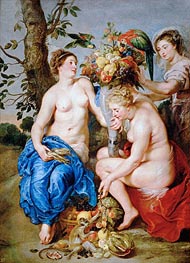
Peter Paul Rubens
Original Size:223 x 162 cm
Prado Museum, Madrid, Spain
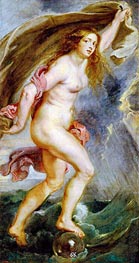
Peter Paul Rubens
Original Size:182.3 x 100.5 cm
Prado Museum, Madrid, Spain

Peter Paul Rubens
Original Size:180 x 69 cm
Prado Museum, Madrid, Spain
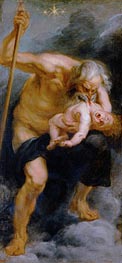
Peter Paul Rubens
Original Size:180 x 87 cm
Prado Museum, Madrid, Spain
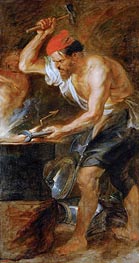
Peter Paul Rubens
Original Size:181 x 97 cm
Prado Museum, Madrid, Spain
